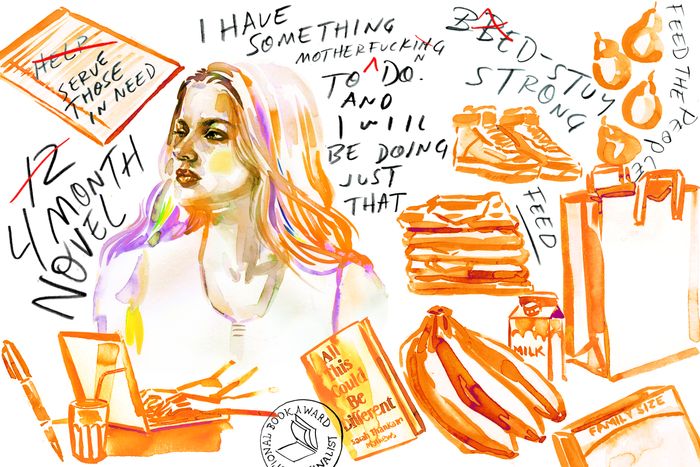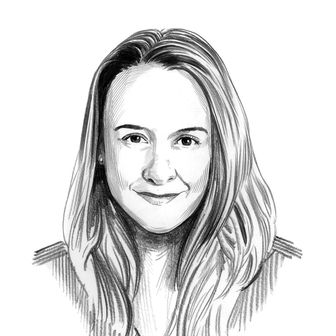
To be honest ÔÇö perhaps too honest ÔÇö I usually avoid novels like┬áSarah Thankam MathewsÔÇÖs simply because I am jealous. Mathews is 31 and beautiful, has an M.F.A. from Iowa, and her debut sold at auction and was a National Book Award finalist. But somehow I overcame my pettiness and picked up┬áAll This Could Be Different, and guess what? I loved it. I loved Sneha, its wry and engaging first-person narrator, who chronicles the agonies and joys of being a 22-year-old brown and queer person working a corporate hell job in Milwaukee while trying to find friendship, community, and love in an often hostile world. Mathews started writing it in the summer of 2020 and finished it four months later,┬áwhile also launching the┬áBed-Stuy Strong┬ámutual-aid network.
We met up in a cute Italian caf├® (in Bed-Stuy, of course), and Sarah answered prying questions about writing, money, making a living, and doing the right thing.
Emily Gould: Tell me about how you ended up writing┬áAll This Could Be Different, which I loved so much, by the way. ItÔÇÖs such a perfect evocation of being in your early 20s, having a terrible job, not knowing who your friends are or who you are. It made me feel so grateful not to be in my 20s, or in Milwaukee, though actually Milkwaukee seemed interesting.┬á
´╗┐Sarah Thankam Mathews: I worked on another book for seven years before┬áAll This Could Be Different, and I threw it away. I was like,┬áYou go in a drawer. I will come back for you in many years.
Did you get an M.F.A.?
´╗┐I did, yeah.
So was that discarded book your M.F.A. thesis?
´╗┐It was. And I worked on it for years before the M.F.A. I worked on it when I had a very demanding day job. It was my writing true north for a while. After the day job, I would write, most often at night. I was living in D.C. Looking back, I realize that book taught me how to write by failing.
What was your day job in D.C.?
´╗┐I worked in progressive politics at a public-affairs firm. And I was in the process of discussing what to do next, what job. After a long-ass circular conversation, my partner was like, ÔÇ£I think you want to be a writer, so be a writer.ÔÇØ I decided to at least apply for M.F.A. programs. I almost didnÔÇÖt apply to Iowa ÔÇö I guess I was hell-bent on rejecting myself from the institution ÔÇö but I got in, and it was fully funded so I went.
YouÔÇÖd had this timeline in your mind of writing at night and having a day job and maybe publishing a novel in your 40s. And yet you ended up publishing your first novel when you were how old?
´╗┐I wrote it when I was 29, and I am 31 now.
So how did you sell your book?
´╗┐I wrote┬áAll This Could Be Different┬áprimarily in 2020. I began the year in a big-time depression because my other book was not working. I couldnÔÇÖt make it work. And I felt very chewed up by New York by virtue of not making enough money. I had lost my primary sources of income because of COVID, and for the first time since my early 20s, my bank account was overdrafting. I felt desperate. ThereÔÇÖs no other way to put it.
What were your primary sources of income?
´╗┐I was the definition of a jane-of-many-trades. I did graphic design, I did simple web design, I did project management. I was a glorified assistant. You name it, I did it. I also did some freelance writing, but that never paid as well or as consistently as anything else. I ended up going on unemployment in 2020, which I was very stressed about for a time because of immigration stuff. I wasnÔÇÖt naturalized yet, and the government asks you all these questions, like if youÔÇÖve ever been on public support.
How did you get out of the depression youÔÇÖd had at the beginning of the year?
´╗┐Love and support and doing online therapy to fucking Joyable.
Wait, what? Joyable? 
´╗┐ItÔÇÖs sort of turnkey online therapy. I didnÔÇÖt have insurance, and for $99 a month, you can use it to talk to a therapist. So anyway, the depression got better. I started to pay attention to the news coming out of Italy and Wuhan and all these other places and was like,┬áOh, shit. This is going to come for us in 14 days.
You came out of a deep depression and immediately had the idea for Bed-Stuy Strong?
´╗┐There was this intersection of clarity and feeling back in my body, feeling the glimmering of my old self and my old agency. I had been talking to my neighbor, who was a Bed-Stuy native, earlier that day. I thought,┬áWhat the hell would he do if there was an Italy-style lockdown? We need to get organized.┬áI spent an afternoon drawing up different ideas on a legal pad for how this would work, and I settled on creating a Slack network. The next day, I went around with my partner and we put up little flyers with a link to the Slack, and that was the first day of what became Bed-Stuy Strong.
By the summer, the project had grown much more robust with more members able to handle the day-to-day, and it felt less like I needed to weigh in on every little decision. I had time to check in with myself. And my intuition was screaming at me,┬áI want you to write, and I want you to write the book youÔÇÖve been thinking about!┬áI had written ten pages of what would become┬áAll This Could Be Different, and I started writing it in earnest in the summer of 2020. By early November 2020, I was looking for an agent.
Wow.
´╗┐I wrote the majority of this book in four months. Writing like I never have before, writing like my hair was on fire. In a way, that was possible because of the CARES Act and because I was on pandemic unemployment insurance and because people who loved me were like, ÔÇ£Write your book.ÔÇØ
Do you think your next book will happen like that too? 
Babe, I donÔÇÖt think so. I think thatÔÇÖs what the last two years have taught me, which is that it was a ÔÇ£once in my lifeÔÇØ thing.
What was the process of selling it to a publisher like? A lot of people wanted to buy it.
The book sold at auction, which was a shock. [She declined to say for how much. ÔÇ£Having some measure of privacy,ÔÇØ she told me later, ÔÇ£is regrettably important for both my sanity and my writing practice.ÔÇØ] What I remember very clearly was my agent calling me to tell me what he thought the best offer was. And I was sitting on a large pile of my month-old laundry. And then he had emailed me the offer letter from my editor where she talked about the book and what it meant to her. I just started crying.
Did you sell film rights at the same time? Have you sold film rights?
No.
No? What?
Do I give off ÔÇ£have sold film rightsÔÇØ energy?
No, I just felt like the book was so cinematic.
Oh, thank you.
It seems like a no-brainer, but I donÔÇÖt really understand how that world works.
People are welcome to come knock down or break down my door on this.
What was getting nominated for the National Book Award like?
Bro.
Do you remember that day?
The day I found out about the NBA longlist, I was doing some gardening so I did not have my phone on me. I came back into the house and washed the soil off my hands and saw that my phone, which had been charging, had 11 missed calls from my agent, one of my best friends, and my editor.
And the first thought of my brittle, fragile brain was,┬áSomething horrible has happened. I am being dragged for who knows what. So I called my agent back and asked what was wrong. He was like, ÔÇ£Oh, so you donÔÇÖt know?ÔÇØ I burst into tears, mostly from shock. It was just not what I expected. That was the moment where I accepted that I have the kind of brain that loves to prepare for bad news and thus is wholly unprepared for good news or, in fact, great, incredible news. After a period of disbelief, I was like,┬áWow, this is so fucking great, such an honor. And IÔÇÖm just going to see what happens here without hoping for a particular outcome. And I think that was good for me.
A Couple More Questions
What have you bought so far today?
I bought a croissant and a green tea at Think Coffee in Williamsburg.
Do you have student-loan debt?
No, because Iowa is fully funded.
Without [fill in the blank], All This Could Be Different would not exist.
Having lived enough life to figure out what I wanted to say.
Who stood in your way?
Same things that stand in all writersÔÇÖ way: self-doubt and rent.
Emily Gould: I decided to have Sarah draw a tarot card from a deck I had with me. I donÔÇÖt know, it just felt right. Her question for the tarot was ÔÇ£What sort of energy should I bring to my next year and what I want to do?ÔÇØ She drew the Queen of Swords, which bodes well for her writing endeavors. The Queen of Swords represents intellectual clarity and mental power in a feminine manifestation. In my deck, Thoth, she looks very chic sitting on a crystalline throne with a sword at her side but not pointed at anyone. Still, she wants to make sure you know itÔÇÖs there.


